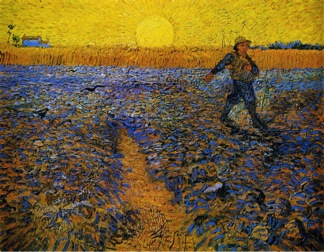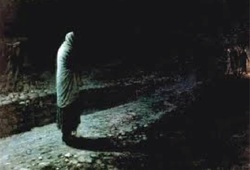“ … A sower went out to sow his seed; and as he sowed, some fell on the path and was trampled on, and the birds of the air ate it up. Some fell on the rock; and as it grew up, it withered for lack of moisture. Some fell among thorns, and the thorns grew with it and choked it. Some fell into good soil, and when it grew, it produced a hundredfold … “ from Luke 8:1-15
There is a poem by Barbara Pescan called “Eastering”
Why this sadness toward spring?
Half smiles at the first yellow flowers,
Tears pooling for no reason with each rain and sunset?
Each year this green show
blows wide winter’s coverings and lets us see
The swell and push of beginning again.
Am I meant to rise too?
To push away what leans against the door of my
pinched heart?
I cannot.
Compassion for myself
is a slow growing crop,
however carefully tended
it yields an unreliable harvest.
These resurrections
ask more than I can give
every time
this hurts more
than the pains of my body
than the old world full of sorrows
this offering of love
this unbearable gift of another chance.
A line in this poem particularly lodges in my mind … “Compassion for myself is a slow growing crop.” I’m from Iowa (that’s where the tall corn grows, as the song has it) and while I didn’t grow up on a farm, one didn’t have to drive much past the outskirts of Muscatine to gaze upon acre after acre of corn and soybeans rising from the rich black soil. As an Iowa girl, I knew that it was a precarious combination of nourishing enough soil, the farmer’s almost ceaseless toil, and the vicissitudes of nature – too much rain, not enough rain, unexpected freeze, savage tornado – which yielded a bountiful or barren harvest.
And so I often think of myself as one of the elements in that combination that spoils the crop – sometimes I’m the soil that’s too stony and infertile for any seed of love or kindness to take root; sometimes I’m the farmer who’s too lazy or careless to work for her harvest, and starves because of it; and sometimes I’m the sudden raging, monstrous whirlwind or torrent that uproots the carefully tended fields and leaves only destruction in its wake.
This parable that Jesus tells in the gospel of Luke concludes “But as for that [seed] in the good soil, these are the ones who, when they hear the word, hold it fast in an honest and good heart, and bear fruit with patient endurance.” With the love of God and one another, may we each find that balance of nourishing soil, willing labor and sustaining, compassionate nature. May we each bring in a bountiful harvest.
Joyce Courtois







 RSS Feed
RSS Feed
